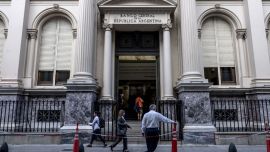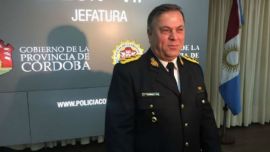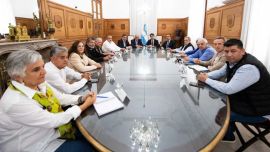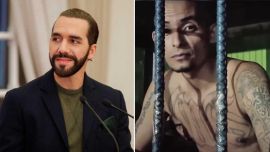A process of radicalisation appears to have taken hold of the Argentine socio-political space in recent weeks, raising already-high tensions to a new level while the global coronavirus pandemic continues to rage on. The deepening and entrenching of arguments on either side of the political divide appear as natural consequences of the fact that 2021 is an electoral year, yet it is troubling to see how both President Alberto Fernández and certain leaders in the opposition have given up their “post-grieta” posture all too quickly, proving their political and ideological fragility. Furthermore, it is another demonstration of the weakness of Argentina’s political institutions and parties, with the ruling Frente de Todos coalition quickly adopting a defensive strategy in the face of the “VIP vaccination” scandal that will undoubtedly alienate moderates across the political spectrum. For evidence of these “pivots toward Kirchnerism,” look no further than Alberto’s speech to Congress this week and Cristina Fernández de Kirchner’s unmissable performance by teleconference in a judicial hearing related to the ‘dollar futures’ case.
Only a year after his inaugural address to the Legislative Assembly, the president appears to have given up on his campaign promise of uniting Argentina. In a fiery speech lasting nearly two hours, Fernández lashed out at his political boss’ two main antagonists: former President Mauricio Macri and the Judiciary. The Macri administration, along with the International Monetary Fund, were the parties responsible for the current economic disaster, the president declared, adding that he had instructed his team to put together a criminal case against the former president’s economic team for “fraudulent administration” and “monetary malfeasance” that would also put its focus on the IMF’s role, including the role played by former Fund chief Christine Lagarde (now president of the European Central Bank). This, along with the increasingly statist posture being taken by his administration — which seems to contradict Economy Minister Martín Guzmán’s policy inclinations — promises to complicate current negotiations with the IMF, seen as necessary but not sufficient to “put Argentina back on its feet.”
Seeking to criminally investigate the previous administration over its economic policy mistakes appears similar to what the Macri administration did with Cristina and her crew with the “dollar futures” case, for which she is now on the verge of an oral trial. During his speech, President Alberto spared no words, mounting an attack on “the only power that appears to live at the margins of the Republican system.” Alberto, a criminal law professor at the University of Buenos Aires and the son of a judge, defended his judicial reform plan which he says would reduce the current power of the Supreme Court, reform the Magistrate’s Council where judges are currently sanctioned, and ask for a Congressional Oversight Committee.
This, of course, is tied to the cornerstone of the ruling coalition’s political interest: that CFK and members of her administration avoid prosecution in several cases currently under investigation or already completed with unfavourable rulings. While most observers should agree that the Argentine judicial system is broken and requires reform, the problem is how to do it in a way that guarantees that it isn’t used politically by the incumbent. While this Alberto fills his mouth with frontal attacks against said Judiciary, his previous self once criticised complicit courts during Fernández de Kirchner’s time in office. CFK used the courts, as did Macri, and both of those circumstances should be condemned.
Which takes us to Alberto’s radicalisation. This same week, Cristina faced a hearing at an appeals court that is expected to rule in favour of an oral trial. The “dollar futures” case is the same one in which the former president and her legal team introduced the concept of “lawfare” a few years ago, which has become axiomatic amongst Kirchnerites and has now permeated the Casa Rosada. In her appearance, the vice-president went on a powerful counteroffensive, accusing the Judiciary of contributing to Macri’s 2015 electoral victory, of mounting a political persecution against her and former officials in her administration, branding them as “a corporation.” Cristina went on to say that the only individuals that benefitted from their administration’s use of dollar futures were Macri-friendly businessmen.
While many of Fernández de Kirchner’s criticisms are correct, the problem is that her vision of “lawfare” only contemplates issues that relate to cases against her and her allies. The same Judiciary that allowed her government to politically persecute and spy on its perceived enemies is now looking for a way out that oversteps the constitutional boundaries. For Cristina, it is reasonable for her to pursue a way out of potential incarceration, particularly for daughter Florencia who doesn’t count with political immunity like her and son Máximo. The problem is when President Alberto, the moderate power-broker fingerpicked to be the head of state, breaks with his centrist tendency to lead a one-sided counteroffensive against anyone who thinks differently.
Social psychologists have been analysing the causes behind radicalisation aimed at understanding jihadism and violent extremism, particularly since the “war on terror” went on overdrive after the downing of the Twin Towers in New York City. In a paper authored by Arie Kruglanski and a series of investigators at the University of Maryland, they build a “radicalisation/deradicalisation model” built on three components: “(1) The motivational component (the quest for personal significance) that defines a goal to which one may be committed, (2) the ideological component that in addition identifies the means of violence as appropriate for this goal’s pursuit, and (3) the social process of networking and group dynamics through which the individual comes to share in the violence-justifying ideology and proceeds to implement as a means of significance gain.” Another paper on the issue authored by Dutch social psychologists Willem Koomen and Joop Van Der Pligt adds other elements such as groupthink, isolation, and leadership, along with polarisation.
The Kirchnerite element of the ruling coalition has a motivational aspiration to consolidate itself as the new form of Peronism, which in turn derives its ideological framework from a 1970s worldview that has been discussed in this column before. Violence, in this case, isn’t physical but institutional, against the system and against perceived enemies. Extrapolating, Alberto has been pulled internally toward the more extreme members of the Frente de Todos, who already had a radicalised position. By taking their main arguments as his, he’s kicked off the electoral campaign, which promises to be more divisive than ever, during one of the most difficult moments in the country’s history.
Alberto Fernández’s radicalisation is a dangerous trend that could cause a lot more harm than bad policymaking, even if a hardline posture helps him win the midterm elections.



















Comments